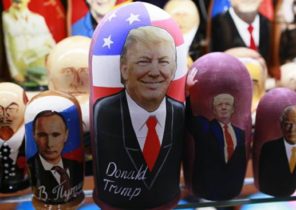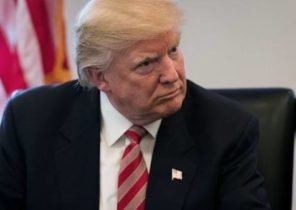Almost a year has passed since then, as the Treaty on elimination of intermediate and shorter-range missiles (INF Treaty), the action ceased. During this time, the risk of a new missile crisis only increased — however, this time in Asia. Freed from the restrictions imposed by the Treaty, the US plans to actively respond to the increase in missile forces of China. Washington is preparing to deploy a new missile ground-based medium-and shorter-range missiles in East Asia, including in Japan. The new American missiles potentially could reach Russian territory.
The only way to prevent a crisis is to adopt a new Treaty on arms control and to persuade China to join him. But Washington daily accused Beijing of all mortal sins, will hardly be able to influence the Chinese leadership. In the present circumstances to do this can only be Russia.
It is not in Russia
Of course, the administration is very reckless trump withdrew from the INF Treaty. This Treaty was a key element of the system of arms control, which helped to create strategic stability between the two largest nuclear powers. Signed in 1987, the INF Treaty obliged the U.S. and Soviet Union to destroy all systems of ballistic and cruise missiles, ground-based medium (1000-5500 km) and lower (500-1000 km) distance, and not to produce, not to test and not to deploy such missiles in the future.
Moreover, the official reason Washington withdrew from the Treaty, does not look convincing. In the state Department believe that “Russia bears full responsibility for the termination of the contract” due to the deployment of cruise missiles 9М729 “Innovator”. At the request of Washington, this type of missiles, the INF Treaty prohibited.
It is not excluded that the US is really considered some aspects 9М729 “Innovator” contrary to the Treaty. However, Washington did not try to solve the problem through negotiations with Moscow and completely out of the INF Treaty.
Actually 9М729 “Innovator” was just a convenient excuse and the real reason for the US withdrawal from the INF Treaty — the rise of China.
Chinese missiles
The strategic military potential of China has greatly increased since 1987, when the US and USSR signed the INF Treaty. Then Beijing was not for Washington to great danger. Sino-American relations (in contrast to the Chinese-Soviet) was on the rise after the establishment of official relations and meetings of President Nixon with Mao Zedong in 1972.
Now the situation is completely different. The administration trump declared China the main opponent of the United States. Thus the mutual restrictions of the USA and Russia on the INF Treaty had nothing to do with Beijing, allowing it to safely deploy as many missiles. Therefore, even though Washington publicly and does not mention the real causes of withdrawal from the Treaty, the administration trump logical from the point of view of containment of China.
Americans have repeatedly expressed concerns about the increasing missile capabilities of the PRC. For example, in April 2017 in the U.S. Congress, Harry Harris, head of Pacific command of the US Navy, said: “the Missile troops of the people’s liberation army [PLA] in control of the largest and most different missile forces in the world, with more than 2,000 ballistic and cruise missiles… Approximately 95% of the installations of Missile troops of the PLA would be contrary to the terms of the INF Treaty, if China was a party to the agreement”.
Unrestricted growth of the missile Arsenal of the PLA is a threat to U.S. forces in South Korea, Japan and GUAM (a US territory). Many States in East Asia also oppose the militarization of the region and establishing Chinese hegemony in the South China sea. Missiles are a danger for Taiwan.
A new arms race
Having dealt with the INF Treaty, the United States will seek to neutralize the regional hegemony of China in the field of land-based missiles. The Secretary of defense mark Esper confirmed this in August 2019. When reporters asked him about the possible deployment of American intermediate-range missiles in Asia, Esper replied: “Yes, I’m for”.
Esper then stated that he would like to make the deployment of new missiles was as soon as possible, but in reality the process will be long. The US still develop new missile systems that go beyond the limitations of the INF Treaty. Unofficial sources say that these systems include low-flying cruise missile with a potential range of about 1000 km and a ballistic missile with a range of 3000 to 4000 km.
It is also unclear where Washington intends to place these new missiles. Most likely, ballistic missiles installed on the island of GUAM, and for cruise missiles with a shorter range is better suited in Japan. Perhaps new missiles deployed in Okinawa, where 70% of us bases in Japan, or on the southernmost of the four main Islands of Japan — Kyushu, where is the base of the U.S. Navy Sasebo.
According to Japanese media reports, the negotiations about the deployment of American medium-range missiles in the country has already begun. However, the defense Minister of Japan, Taro Kono, has denied these reports in November 2019.
However, regardless of the specific dates and the exact locations of the missiles, it is already clear that Asia starts a new arms race. The already tense relations between the US and China will become even more explosive.
The arms race between the two superpowers, reflected badly on the global economy. Without close cooperation between Washington and Beijing to revive the economy after the pandemic will not be easy.
In the hands of Moscow
While Moscow’s position in relation to the looming missile crisis is reduced only to condemn the United States for the withdrawal from the INF Treaty and their rejection of the Russian proposal to impose a moratorium on the deployment of new land-based missiles of medium and shorter-range missiles. This is an understandable reaction, but not quite pragmatic.
The INF Treaty is dead, and in its original format to resuscitate him impossible. The only way to prevent a crisis is to sign the new agreement on arms control, which will include not only the United States and Russia, but also China.
Beijing has refused to join the advanced INF Treaty, and I think Moscow is ready to take this position. But this state of Affairs, when China is free to deploy missiles of any type, anywhere, undermines the balance of power in the region, resulting in its destabilization.
Russia can play a crucial role in order to convince its strategic partner to join the negotiations on arms control. In addition, a new tripartite agreement would be beneficial to Russia itself.
First, China is rapidly increasing its nuclear capability and superiority of Russia in this area in the future may be in question. Second, the Chinese medium-range missiles could possibly hit targets on the territory of Russia. Today Russian-Chinese relations as never trusting, but there is no guarantee that it will always be. Thirdly, persuading China to join a new Treaty on arms control, Moscow will be able to prove that relations with Beijing, it is not just a supplier of raw materials, as they say many observers.
China refuses to join the negotiations on a new INF Treaty because of the peculiarities of its Arsenal of missiles. Unlike USA and Russia, who have a considerable amount of missiles, air-and sea-based, Chinese missiles is mainly terrestrial type and range included in the INF Treaty. Thus, the terms of the contract would be harder hit in China.
This fear of China is true and requires attention. To solve this problem by changing the text of a new Treaty. It is essential that in contrast to the old INF Treaty the new Treaty also governed to a certain extent air missiles and sea-based. Less concessions are unlikely to convince Beijing that all powers are paying the same price in this deal.
Beijing also complains that the conditions of the new agreement will not apply to Taiwan, whose military forces are also equipped with land-based missiles of medium and shorter-range missiles. But this argument is unconvincing, because missiles to Taiwan obviously for defense purposes, that is, pose a threat to the forces of the PRC only in the case of a military invasion of the island.
Of course, to agree on a new Treaty that could replace the INF Treaty, will not be easy. This became particularly evident in may, when trump led the United States out of the open skies Treaty that allows reconnaissance flights over the territory of thirty-five States in Europe and North America. And in February, 2021 th will expire the Contract on strategic offensive arms (start-3), if its extension is not negotiated.
Some hope that the situation will improve, if in November, the tramp loses the election the former Vice-President of the USA Joe Biden. Indeed, Biden appreciates international treaties are much more than trump. However, in the field of arms control in Washington have established a bipartisan consensus that any new contracts should be extended to China.
It is clear that the Russian government complained that Washington is undermining the old system of arms control. But the INF Treaty did not return, and if Moscow will not propose new contracts, it will have to participate in the arms race with the USA and China, where it will have the least economic power.
To avoid a crisis that could put East Asia on the brink of war, Russia should use its influence to persuade China to join negotiations on new international treaties on arms control.







